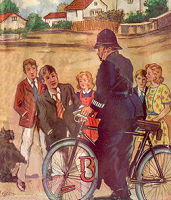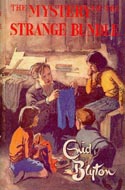
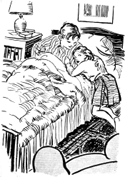
Bets is scared by the voices in Fatty's room—but it's just Fatty's new ventriloquist trick!
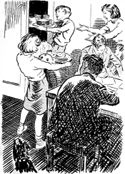
The children organise tea in Fatty's room and discuss the matter of the strange bundle.
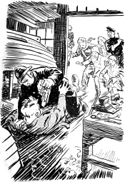
An enraged Mr Goon grabs Fatty and stuffs sopping wet clothes down his neck!
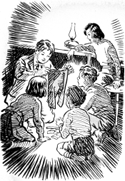
The clothes are very small—almost childlike.
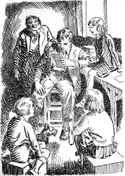
The Find-Outers go over their notes once more.
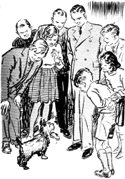
Just when it looks like bitter disappointment for the Find-Outers, Buster saves the day!
The Mystery of the Strange Bundle
Review by Keith Robinson (February 3, 2005)
This is a strange mystery. Maybe it should be called The Mystery of the Strange Mystery, because not only is the mystery itself strange, but the way the Find-Outers get involved is strange too. That is, compared with the way they normally get involved. This isn't the first mystery they've stumbled upon accidentally, nor is it the first time they've been completely stumped. But unlike other mysteries or adventures, they don't actually get to solve this one. All they do is relay what they know to Chief Inspector Jenks and his Very Important Hush-Hush colleague, who in turn explain the story behind the mystery and the strange clues. And the strangeness doesn't end there. In this, Mr Goon not only loses his temper (as usual) but actually goes at Fatty and attacks him! And at the end, Mr Goon is invited to tea at Fatty's house—which he accepts and seems to enjoy. Strange indeed!
The plot involves Mr Fellows, a neighbor two doors down from Larry's house. It transpires that Mr Fellows is witnessed running from his house in the early hours of the morning wearing his dressing gown, pyjamas, and slippers—and carrying a strange bundle. Meanwhile a burglar ransacks his house, leaving a right old mess for the milkman to find the next morning. Hearing the gossip, the Five Find-Outers snoop about the house, and Fatty—hearing a kitten mewing—takes it upon himself to venture inside and have a good look around. There he finds a small red glove—a clue! But a clue to what? He pockets it, very puzzled. Why would Mr Fellows have a child's clothing in his house?
It's at this point that Mr Goon arrives and finds Fatty poking about. And it's at this point that Fatty makes use of his new trick, his ventriloquism (more on that in a moment).
Disguising himself, Fatty sets out one night to talk to nightwatchmen about "his Uncle Horatious," who is known to sleepwalk. The night watchman reveal that they did see someone wandering about in his dressing gown the other night, and from this Fatty gleans where Mr Fellows had been heading—down to the river. Maybe Mr Fellows threw the mysterious bundle in the water! Unfortunately Mr Goon is also out and about, following the same line of questioning, and he runs into the disguised Fatty and follows the "mysterious stranger" to the river. Fatty is carrying a sack loaded down with bricks, just to get Old Clear-Orf interested, and he hoists this into the river and bolts away.
The next day the Find-Outers decide to go down to the river and hire a boat, so they can perhaps fish about and see if they can find the bundle. But Mr Goon beats them to it, and takes the only boat out. He fishes around and eventually finds what he thinks is the bundle his "mysterious stranger" threw in—but in fact it's the real bundle that Mr Fellows threw in: a bag full of wet child's clothes. Goon immediately comes to the conclusion that Fatty has been playing tricks on him again, and he stuffs the wet clothes "down Fatty's neck." This whole scene—with Mr Goon out in the boat, and a scar-faced man hanging around a little further along trying to find Mr Fellows' bundle himself—is very nicely done and it made a nice change for Goon to walk away empty-handed but triumphant for a change.
The mystery itself is intriguing. Very intriguing, actually, certainly more interesting that your usual run-of-the-mill burglaries. The ending is satisfying enough; it's just a shame that the Find-Outers didn't actually solve anything. They were on the right track, but had absolutely no chance of finding the mysterious burglar. I think this story could have involved the Find-Outers more, had Enid Blyton thought about it more; if the whole mystery had started a little earlier and there was more room to finish, Fatty could possibly have found out why the clothes were so important to the burglar and maybe acted to trap the burglar as well. This would have been more satisfying, I think. But there weren't enough pages for that, so Jenks had to come over and get himself involved, thus taking the mystery out of the Find-Outers' hands.
I spent the first few chapters tut-tutting. Fatty has developed a new skill: ventriloquism. This is a nice idea, but Blyton takes it too far and the result is not believable in the slightest—at least, not to an adult! Even when I was younger I questioned the ability to "throw one's voice" and make it seem like the voice is coming from somewhere else. The antics Fatty gets up to are funny, and make Goon look a right idiot, but it's so unrealistic that, for me, the whole thing falls down and becomes a farce, the sort of thing you see in a kiddies' pantomime. If I'm standing there talking to a policeman and I start growling like a dog (even without moving my lips), there's no way on Earth the policeman is going to look behind him and wonder where that noise came from. Funny, yes. Believable? Not a chance.
I also have to mention my amazement when Mrs Trotteville called her son Fatty. In one scene it was Frederick as usual, but then she shouted "Fatty!" when Buster was clambering all over his bed. I thought it was an error, but later she does it again, calling her son Fatty. What mother would do such a thing, even if it is his nickname?
It's said that Enid Blyton wrote her books over four or five days—around 10,000 words a day. Phew! It's also said she made much of it up as she went along. Certainly the details are made up on the fly, and this sometimes shows in small ways, like when Fatty leaves Mr Goon alone at Mr Fellows' house, rushes over to Larry's two doors down, and they sit for a while discussing everything they've learnt...and then, by the way, it's revealed that Fatty has brought the kitten back with him after it conveniently jumped out of the window as he was leaving Mr Fellows' house. I suspect this was a plot device added in because it makes a great excuse for Fatty to go and see Mr Fellows later on.
Another possibly contrived detail was down at the river, when Goon is attacking Fatty. Where's Buster when all this is going on? It's revealed after a while that Buster had gone off with another dog, rabbit hunting. He turned up later that day. Good job he was gone, too, because he might have interfered with Blyton's plot! ;-)
So, to sum up, by far the worst aspect of this book is the ventriloquist act, or rather the way in which Fatty uses it so easily and so effectively. Other than that I started enjoying this mystery once it got going, even though the Find-Outers only got to "solve it" by sheer chance—thanks to Buster! Yes, a strange book, this.
Additional Note: There's a glaring error, says Nigel from the UK, towards the end concerning Bets and the handkerchief belonging to the ventriloquist's dummy...
P143 (Methuen First Edition)
"There's the hanky, look," said Bets, holding it out to him. "It's such a dear little hanky. I suppose I couldn't keep it..."
"Yes. You keep it," said Fatty...
Bets blushed, and put the little hanky into her pocket.
But on P153, after the thief ransacks the shed:
"Look—the tiny hanky with daisies on it..." she said. "The thief must have dropped it when he took the other clothes."
The original book, Nigel says, goes on to say that Bets then picked it up and put it in her pocket (again!). Naturally I flipped through my 2003 Egmont edition to check this, and it's interesting to note that the error has been corrected!
P197-198 (Egmont 2003)
"There's the hanky, look," said Bets, holding it out to him. "It's such a dear little hanky. I suppose I couldn't keep it..."
"Yes. You keep it," said Fatty...
Bets blushed, and put the little hanky into her pocket.
And on P211:
"I've just remembered—the tiny hanky with daisies on it and the name Eurycles is in my pocket," she said. "The thief wouldn't have found it with the other clothes."


